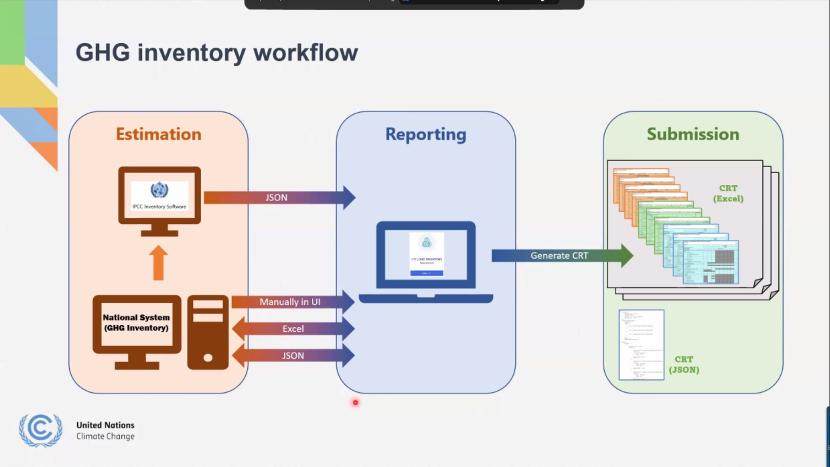By invitation only
Contextual Overview:
In accordance with Article 13.5 of the Paris Agreement, the objective of the enhanced transparency framework of action and support (ETF) is to provide a clear understanding of climate change action, including clarity and tracking of progress towards the achievement of Parties' nationally determined contributions (NDCs) and adaptation actions, including effective practices, priorities, needs and gaps, and on the support provided and received by relevant Parties to the Agreement, in order to inform the implementation of climate change action.
Addressing climate change implies the implementation of mitigation and adaptation activities. Thus, countries need to integrate climate change considerations into all national planning instruments; strengthen institutional and technical capacities; implement activities in relevant sectors, addressing data gaps and improving assessment methodologies, and collecting accurate and up-to-date information to establish and regularly update greenhouse gas emission databases.
COP28 in Dubai marked the conclusion of the first Global Stocktake (GST), which is the primary mechanism for assessing the collective progress under the Paris Agreement and charted the way forward. The GST aimed to align efforts on climate action, identify measures to bridge gaps and enable in progress. Under the Paris Agreement, Parties are obligated to submit their first Biennial Transparency Report (BTR1) and, if applicable, a stand-alone national inventory report. These submissions must adhere to the Modalities, Procedures, and Guidelines (MPGs) outlined in decision 18/CMA.1, with a deadline set for no later than 31 December 2024. Following decision 5/CMA.3, the UNFCCC secretariat has been tasked with creating electronic tools for reporting through common reporting tables and formats, ensuring a test version of these tools is available by June 2023, and releasing the final version by June 2024. Additionally, the secretariat is to organize periodic technical training workshops, offering a hands-on experience with the reporting tools to experts from the Parties.
This training will also be a key part of the preparations for the upcoming COP-29 in Baku, Azerbaijan, where discussions on climate finance and new collective goals on this sensitive issue will continue. Representatives of the COP-29 Presidency from Azerbaijan will also attend the training.
In 2024, the UNFCCC Secretariat is prioritizing the necessary support for the timely submission of the first Biennial Transparency Reports (BTRs) and NDC3.0 with greater ambition as suggested by the Global Stocktake completed in 2023. Timely submission of BTRs is a key step in demonstrating the successful transition of the ETF into a fully operational phase. To facilitate this process, the Secretariat has released test version of the reporting tools to collect feedback from Parties, with an aim to finalize the reporting tools in June 2024. Furthermore, the secretariat is partnering with various organizations to conduct comprehensive technical training workshops on the reporting tools for the experts from Parties. Such training workshops aim to ensure that the Parties are well-equipped to use these tools effectively for submitting the necessary information and data for the first BTR, in accordance with the agreed-upon modalities, procedures, and guidelines. The upcoming regional training workshop is a collaborative effort involving the UNFCCC, the UNDP, and the Government of Kyrgyzstan.
UNDP has already played a crucial role in enhancing the Kyrgyz Republic's Transparency framework through the development of “Recommendations and proposals for the development of the Monitoring, Reporting and Verification System” in 2022. And. In order to establish the Enhanced Framework for Transparency (ETF) for Kyrgyzstan under Article 13 of the Paris Agreement, the MNRETS with technical expert support from UNDP is working on the Capacity Building Initiative for Transparency (CBIT) to GEF. CBIT is aimed at strengthening national institutions involved in supporting the development and implementation of the ETF in accordance with national priorities, as well as providing appropriate tools, training and assistance to implement the provisions stipulated in Article 13 of the Agreement and further promote transparency.
With support of “Climate Promise1” the updated NDC of the Kyrgyz Republic sets out a climate change strategy for 2030 – with concrete and achievable actions - and recognizes the importance of adopting a Low-Carbon Development Strategy and a National Adaptation Plan (NAP). In addition, under the NAP2process, the updated roadmap for improving climate change statistics in the Kyrgyz Republic will being to develop to introduce new statistical indicators that will inform the transparency of climate action.
As a result of the training workshop, it is expected that experts from Central Asian countries receive:
1. Guidance on Reporting:
- To obtain a broad understanding of the reporting requirements under the ETF and its modalities, procedures and guidelines (MPGs);
- To get explanation of the type of information to be reported in the common reporting tables (CRT) for greenhouse gas inventories and in the common tabular formats (CTFs) for tracking NDC progress and for support provided and received.
2. Practical Training Sessions:
- To conduct hands-on training on the three ETF reporting tools - The Secretariat will demonstrate the functions of the reporting tool and provide exercises aimed at enhancing the capability of Parties to report accurately and efficiently.
In addition to professional development, the hands-on training will also provide an opportunity to strengthen the network of local stakeholders in climate action and support, including climate finance and climate reporting in Central Asia, guiding cross-country collaboration and peer-to-peer knowledge sharing.
Format of the event
It is expected that the practical regional training will be attended by 2 representatives of Ministries, agencies, organizations - focal points of UNFCCC from Central Asian countries involved in transparency and climate reporting activities.
The format of the event is face-to-face, personal presence of the training participants is necessary to fulfill the practical exercises that are defined during the training. Each participant should have his/her own personal computer, internet access will be provided by the event organizers.
The language of the event is Russian with simultaneous translation into English.
